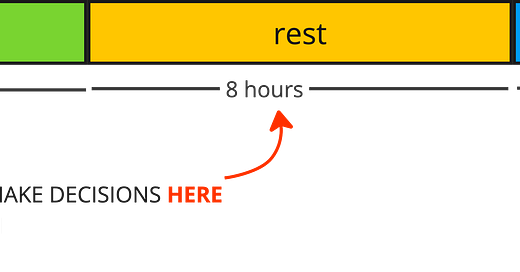Some time ago, I heard from some colleagues that hour rate-based decisions would simplify your life, so if you have to do something, compare your hourly rate with the rate of a professional in that field. In this issue, I’d like to explain what is wrong with that approach and where you should focus.
As you might know, I’m from software engineering, so my hourly rate is relatively higher than many other jobs. A conjunction of that with the rule “pay if someone’s time is cheaper than yours” brings many issues and eventually brings unhappiness. Let me explain
After the first 20 issues and ~4.5 months of doing this weekly I see that to growth a list of subscribers it is still the requirement to actively promote the weekly on other platforms. At the same time it is a pretty strong commitment for volantaury activity. So I decided to not put it on schedule but rather publish on demand and use rather as a platform for long posts.
I also invite you to join DevTower telegram channel for more frequent updates and collaboration. See you there
Logical consequence “Do it by yourself if your time is cheaper” does not work
Plenty of different areas like legal, medicine, and accounting are nearly impossible to do by yourself, even if your time is cheaper. So, it requires a ton of extra education, so we have a steep learning curve. These exclusions highlight that the rule does not work perfectly well.
One-time job activities
Sometimes, deep extra expertise is not required, or there is a shallow learning curve, but the job has to be done only once. It is impossible to reuse the experience and accumulated knowledge. For example, if you have a good public profile, you could try to apply for UK’s Global Talent Visa. That will require highlighting the most critical aspects of your work relevant to this particular type of visa. This is a one-time job. You won’t apply for GTV after success again because it does not make sense. At the same time, building your submission properly will require 2-3+ months.
On the other hand, some services lead you by the hand through this submission, but the cost is 5 000 GBP (~6 000 USD). You might have a relatively smaller income, so self-submission of documents sounds fine. Or not?
Do not underestimate lost opportunities and knowledge because you were busy for long months deep-diving into processes that will never repeat.
Correlation between rest and hour rate
Usually, you get paid with an implicit contract that the other part of your time you should get recovery to produce the same result predictably.
Using your hourly rate to make decisions regarding personal activities assumes that you work all your non-sleeping time. But if you spread your hourly rate on all your time, you would also see that your recovery time is paid, not extra work time.
So, if there is no recovery, what will happen to your efficiency and results? How does your focus keep strong? How long will you keep the same hourly rate, at least?
Satisfaction impacts motivation
You likely prefer doing something you like rather than something you don’t. That is obvious. I believe that doing your favorite things gives you a much higher probability of success than otherwise. So why should you base your decisions on short-term money profit but not long-term success?
Conclusion
The hourly rate does not work as a criterion for personal decisions. Here are a few arguments that I rely on. Are there any doubts? I invite you to join our community and discuss or subscribe to the channel




